Title IX – History, Importance, and the Story of Carol Hutchins
51 years ago, one of the most important pieces of legislation was signed into law by then President Richard Nixon. June 23, 1972 will forever be the day we honor and celebrate those who came before us to ensure protection by the law from sex discrimination in activities in any institution that receives federal aid. This marked a huge milestone in the fight for equality in sports, programs, and activities.
The law reads verbatim: “No person in the United States shall, on the basis of sex, be excluded from participation in, be denied the benefits of, or be subjected to discrimination under any education program or activity receiving Federal financial assistance.”
Why Title IX is Important
Educational Opportunities
Title IX not only eliminates the ability to discriminate on the basis of sexual orientation – it gave freedoms to women that they historically did not have before, and made them protected by the law. One of those freedoms is the right to an education. Women were routinely denied the right to an education. In 1970, women made up only 14% of doctoral degrees; in 2007, they accounted for more than 50% of doctoral degrees. This spike in education for women is due in large part to the commitment by women who fought for it to be signed into law; without their unwavering commitment and pressure on lawmakers, we would not be where we are today.
Participation in Sports
Before Title IX was enacted, women were not guaranteed the right to participate in sports, much less have the same opportunities afforded to them as their male counterparts. That all changed with the enactment in Title IX; participation in sports for girls and women skyrocketed, both at the high school level and the collegiate level. Under Title IX, federally-funded institutions are required to be rewarded equally with scholarships; this means that they do not necessarily need to have the same number of scholarships, but they have to be granted the same amount of funding for women’s and men’s sports. Women and men’s sports are also required to have access to the same types of facilities, training centers, and equipment.
While we still have a ways to go in the fight for equal treatment, we have come a long way in the 51 years since the enactment of Title IX. Girls and women today are forever indebted to those who paved the way before us in moving mountains to get Title IX signed into law.
Empowering Girls Alum Carol Hutchins – Story of Title IX
You may recall from our Empowering Girls event 2022 when Carol Hutchins, record-breaking softball coach at University of Michigan, shared her story about how a fire was lit under her during college in regard to Title IX. She was told by the men’s basketball coach at Michigan State, where she was on the women’s basketball team, to “get off the court, because nobody cared about women’s basketball”. If you know Coach Hutch, you know that didn’t sit well with her. She and her teammates went on to write a formal complaint citing the Title IX violations they were experiencing; later they went on to file a lawsuit to cite the lack of funding in women’s sports compared to men’s, as well as the obvious inequities in their facilities. The lawsuit was settled and small improvements were made, but it was just the start of a lifelong career of standing up and speaking out for women’s rights. She went on to be hired at Michigan as the head coach of the softball team, where she was a coach, a groundskeeper, a secretary, and facilities maintenance person – this all while the men’s teams had full coaching staffs and their own groundskeepers.
Fast forward to today, Coach Hutch retired in 2022 with the most wins as any head coach in the history of Michigan, and at the time, as the winningest softball coach in the history of the sport. She remains an active voice today in calling out inequities and lifting up women around her. We are so proud to have had her as a speaker at our event in 2018 and 2022!
Ways to Learn About Title IX
Our team has put together resources for you to learn more about the history of Title IX, the key players in the fight for justice, and the continued fight for equality happening today.
Movies
50 Years of Title IX: USC Athletics Documentary
ESPN+ Fifty/50 Collection (50th Anniversary Special Feature)
Articles
Duffy Law – Importance of Title IX



